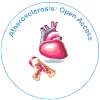Induced Activation of the Procoagulant Pathways and the Pathogenesis of Ischemia, Venous Thrombosis
Received Date: Jul 29, 2022 / Accepted Date: Aug 22, 2022 / Published Date: Aug 25, 2022
Abstract
A pathway is outlined through which diminished levels of oxygen activate the transcription factor early growth response-1 (Egr-1) leading to de novo transcription/translation of tissue factor in mononuclear phagocytes and smooth muscle cells, which eventuates in vascular fibrin deposition. The procoagulant response is magnified by concomitant suppression of fibrinolysis by hypoxia-mediated upregulation of plasminogen activator inhibitor-1. These data add a new facet to the biology of thrombosis associated with hypoxemia/stasis and imply that interference with mechanisms causing Egr-1 activation in response to oxygen deprivation might prevent vascular fibrin deposition occurring in ischemia without directly interfering with other pro/anticoagulant pathways.
Citation: Yan SF, Mackman N, Kisiel W, Stern D, Pinsky D (2022) Induced Activation of the Procoagulant Pathways and the Pathogenesis of Ischemia, Venous Thrombosis. Atheroscler Open Access 7: 182.
Copyright: © 2022 Yan SF, et al.. This is an open-access article distributed under the terms of the Creative Commons Attribution License, which permits unrestricted use, distribution, and reproduction in any medium, provided the original author and source are credited.
Share This Article
Open Access Journals
Article Usage
- Total views: 1860
- [From(publication date): 0-2022 - Mar 31, 2025]
- Breakdown by view type
- HTML page views: 1407
- PDF downloads: 453
